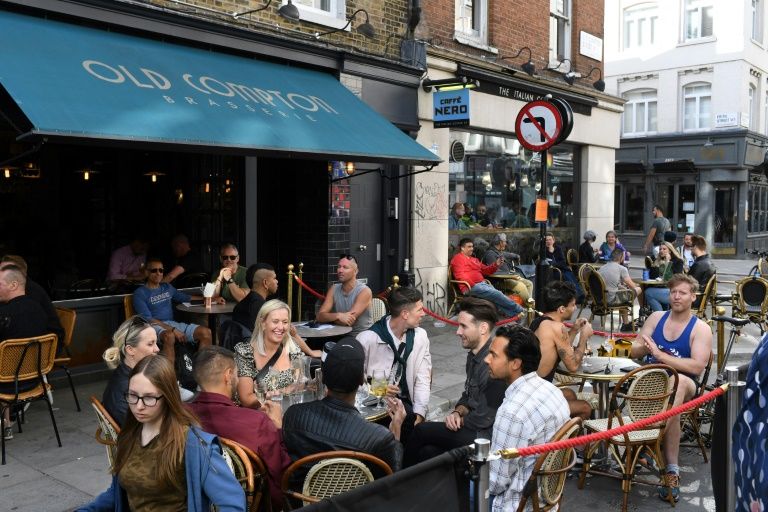‘Wake-up’ call in Europe as virus surges back
Copenhagen (AFP) – The World Health Organization on Thursday warned of “alarming rates of transmission” of Covid-19 across Europe and cautioned against shortening quarantine periods as countries in the region scrambled to find ways to reduce infections without resorting to new lockdowns.
The WHO’s regional director for Europe Hans Kluge said a September surge — Europe set a new record last week, with some 54,000 cases recorded in 24 hours — “should serve as a wake-up call for all of us.”
“Although these numbers reflect more comprehensive testing, it also shows alarming rates of transmission across the region,” he told an online news conference from Copenhagen.
In Britain, new restrictions will take effect Friday, with Prime Minister Boris Johnson warning that pubs may have to close earlier to help avoid a “second hump” of coronavirus cases.
Residents of northeast England, including the cities of Newcastle and Sunderland, will no longer be allowed to meet people outside their own homes or immediate social circles.
The government already imposed rules across England on Monday limiting socialising to groups of six or fewer, as daily cases reached levels not seen since early May.
Britain has been Europe’s worst-hit country, with the government registering nearly 42,000 deaths.
The city of Madrid meanwhile backtracked on a plan for targeted lockdowns and said it would instead move to “reduce mobility and contacts” in areas with high infection rates.
WHO Europe said the UN health body would not change its guidance calling for a 14-day quarantine period for those exposed to the virus.
The recommendation is “based on our understanding of the incubation period and transmission of the disease. We would only revise that on the basis of a change of our understanding of the science,” WHO Europe’s senior emergency officer Catherine Smallwood said.
France hs reduced the recommended length for self-isolation to seven days, while it is 10 days in the UK and Ireland. Several more European countries, such as Portugal and Croatia, are also considering shorter quarantines.
– Vaccines for the rich? –
Elsewhere, a study released by Oxfam found that rich nations have already bought up over half the promised Covid-19 vaccine stocks.
“Access to a life-saving vaccine shouldn’t depend on where you live or how much money you have,” said Robert Silverman of Oxfam America.
Drugs companies are racing to produce an effective jab to counter a virus that has now killed more than 940,000 people around the world and infected almost 30 million.
The five leading vaccine candidates currently in late-stage trials will be able to supply 5.9 billion doses, enough to inoculate about three billion people, Oxfam said.
Some 51 percent of those jabs have been snapped up by the wealthy world, including the United States, Britain, the European Union, Australia, Hong Kong and Macau, Japan, Switzerland and Israel.
The remaining 2.6 billion have been bought by or promised to developing countries including India, Bangladesh, China, Brazil, Indonesia and Mexico.
US President Donald Trump pledged to begin inoculating Americans within weeks.
He said he would begin rolling out a vaccine as soon as next month, despite doubts expressed by a top government health expert who said a jab was unlikely to be widely available until mid-2021.
Democrats have expressed concern that Trump is pressuring government health regulators and scientists to approve a rushed vaccine in time to help his uphill bid for re-election in early November.
But in an implicit swipe at Trump, EU chief Ursula von der Leyen said Wednesday that Europe would support multilateral bodies such as the WHO and a more equitable rollout.
“None of us will be safe until all of us are safe -– wherever we live,” she said. “Vaccine nationalism puts lives at risk. Vaccine cooperation saves them.”
As tragedies multiply, governments face legal action from citizens for alleged response failures.
A French association of Covid-19 victims plans to file a legal complaint against Prime Minister Jean Castex over France’s handling of the pandemic, its lawyer said.
The 200-member group accuses the government of “playing it by ear” in its response, lawyer Fabrice de Vizio told AFP.
In China, however, bereaved relatives have had their lawsuits abruptly rejected while dozens of others face pressure from authorities not to file, according to people involved in the effort.
The families accuse the Wuhan and Hubei provincial governments of concealing the outbreak when it first emerged there late last year, failing to alert the public and bungling the response.
burs-gd/adp
Disclaimer: Validity of the above story is for 7 Days from original date of publishing. Source: AFP.


